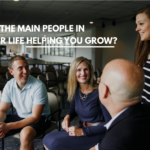You and I have at least four things in common:
- We were born.
- We will go through hard times in life.
- We will pay taxes.
- We will die.
We are united in that we are similarly born with an incurable sexually transmitted terminal condition. It is what we think and do during that short period of time between human birth and human death that makes all the difference in our individual outcomes and the quality of our lives.
Life is full of good times and bad. There is no escaping this reality. Everyone experiences this variety at some point. No one gets a free pass. It is the unique human experience.
Why do some people, after going through trauma, tragedy, rejection, failure in business, relationships or other terrible experience, come back even better and stronger than before?” Other people go through similar trials and tribulations and return to their previous levels of health; while an unfortunate few never recover at all – becoming emotionally scarred and sometimes physically disabled. Sometimes people will slip into a funk or a depression after a relationship breaks up or a terrible medical diagnosis is delivered. Many binge on alcohol or drugs. Others lash out in anger and violence. Many people can’t seem to handle life’s bumps and bruises. Others seem impervious – almost invincible. When they run into hard times, they rebound almost immediately, often times to higher levels than before.
Why? Why are some people emotionally resilient and others are not? This is a question that has been diligently studied by experts, with a variety of conclusions. This question has been of unique interest to me for several years.
I’ve learned that there are things that we can to do improve upon our resiliency. This is good news. I want to be more resilient. I bet you do as well.
Here are my top 13 suggestions on what you can do, now, to become more resilient in your life:
- Recognize that resilience is a choice. Choose it!
- Become an optimist. Indulging in negative thinking is one of the most expensive hobbies that you can have.
- Identify one or more resilient role models. Do what they do.
- Focus on the process, not the outcome.
- Find strength in your faith in God.
- Practice altruism. Help others. Be compassionate and get your mind off of yourself.
- Stay physically fit. Resiliency requires stamina and energy.
- Laugh as much as you can. Don’t take things too seriously.
- Anticipate that post traumatic growth will happen. Think “What does not kill me will make me stronger.”
- Think “What is the worst thing that could happen?” Visualize it, then say to yourself, “I will let go, and let God.”
- Develop and practice an attitude of gratitude.
- Practice patience. The fastest results come from being infinitely patient.
- Live in the moment. Be willing to sit in silence. Practice mindfulness.
Resilience is not a trait. Resilience is a capacity that involves behaviors, thoughts and actions that can be learned and developed, in anyone, at any point in their lives. It is never too late to become resilient.














I don’t think the title of your article matches the content lol. Just kidding, mainly because I had some doubts after reading the article. https://www.binance.com/en/register?ref=UM6SMJM3
I don’t think the title of your article matches the content lol. Just kidding, mainly because I had some doubts after reading the article. https://www.binance.info/fr/join?ref=W0BCQMF1
Thanks for sharing. I read many of your blog posts, cool, your blog is very good.
I don’t think the title of your article matches the content lol. Just kidding, mainly because I had some doubts after reading the article.